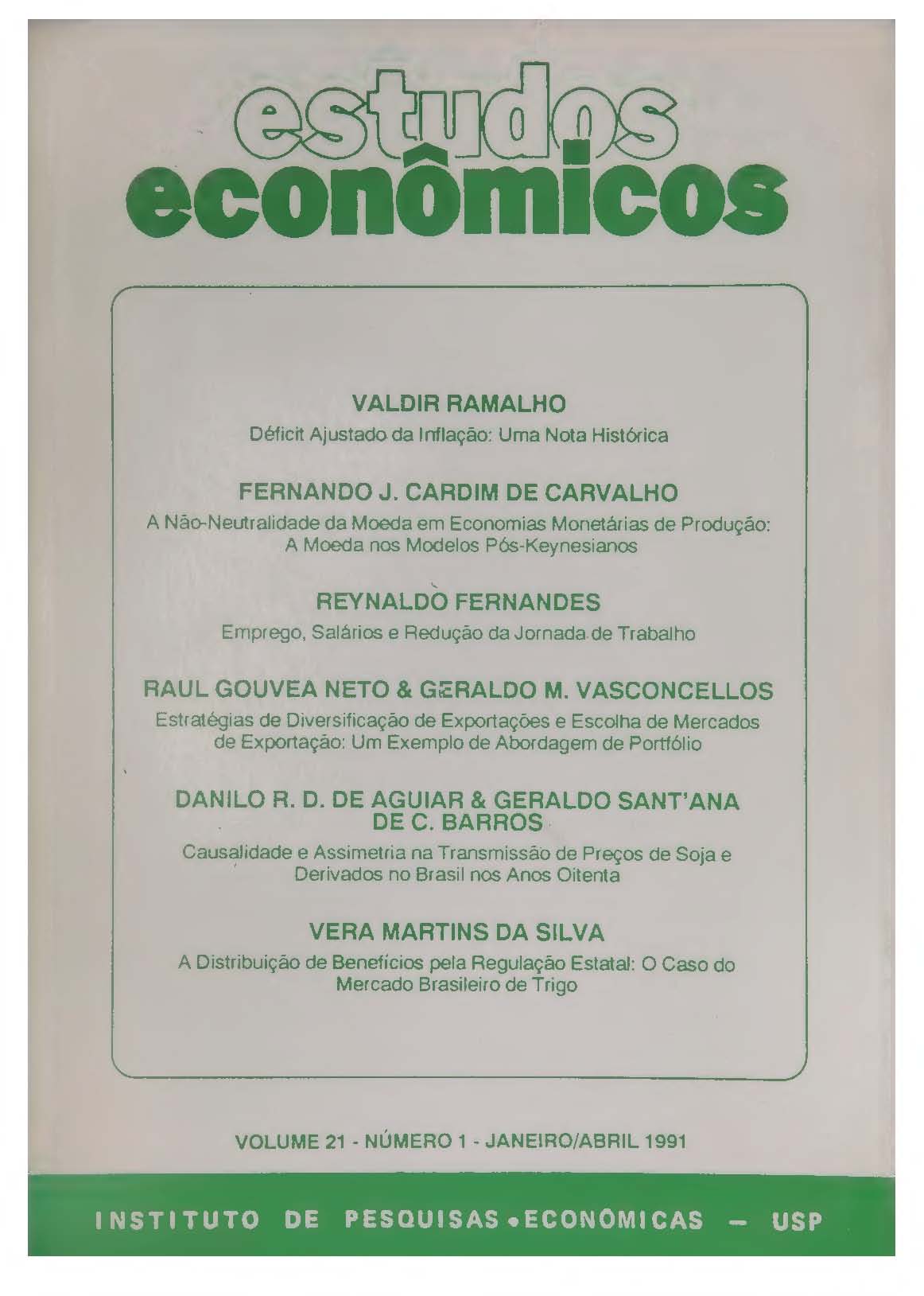A distribuição de benefícios pela regulação estatal: o caso do mercado brasileiro de trigo
Keywords:
Regulation, Wheat, SubsidesAbstract
This article deals with the regulation of the Brazilian wheat market, trying to evaluate how the benefits were divide among consumers and wheat producers from the point of view of the nominal and effective protection rate. So, it is an analysis based on international economics and its basic results indicates that during the period 1967-85 in benefited consumers whereas during 1985-87 it benefited wheat producers in terms of the nominal protection rate. When we consider the protection of the fertilizers market, we get to the conclusion that the effective protection rate is negative, indicating that wheat producers were not so protected as one would imagine just looking at the nominal protection rate.
Furthermore, the evidence suggests that, on the contrary of the current opinion, the low and middle income classes were the great beneficiaries of the wheat price subsidy policy to consumers in the seventies.
Downloads
References
BAILEY, E. etalii. Deregulation the airlines. Cambridge, Mass., MIT Press, 1985.
CALEGAR, G. M. & SCHUH, E. Costs, benefits and food consumption impact of the Brazilian wheat price policy. Washington, D. C., International Food Policy Research Institute, 1986.
CAMPINO, A. C. C. et alii. A questão alimentar no curto prazo: um desafio para a política econômica. São Paulo, FIPE-SEPLAN, 1986. (Relatório de Pesquisa não publicado, v. 2, p. 172).
CORDEN, W. M. The theory of protection. Oxford, Clarendon, 1971.
FARINA, E. M. M, Q., CYRILLO, D. C. & CAMPINO, A. C. C. Impacto da retirada do subsídio ao trigo sobre o consumo e produção nacionais. São Paulo, FIPE-INAN, 1988. (Relatório de Pesquisa não publicado).
GRIFFIN, K, The political economy of agrarian change, an essay on the green revolution. 2 ed., London, Macmillan Press Ltd., 1979.
KNIGHT, P. T. Substituição de importação na agricultura brasileira: a produção de trigo no Rio Grande do Sul. Estudos Econômicos, São Paulo, 7(3):71-101 e 115-117, 1971.
KNIGHT, P. T. Substituição de importação na agricultura brasileira: a produção de trigo no Rio Grande do Sul: resposta ao comentário de A. R. Silva. Estudos Econômicos, São Paulo, 3(1):162-166, jan/abr 1973.
LABINI, P. S. Oligopólio e progresso técnico. Rio de Janeiro, Forense, 1980.
PASHIGIAN, P. The effect of environmental regulation on optimal plant size and factor shares. The Journal ofLaw and Economics, Chicago, 27(1):1-28, Apr. 1984.
PELTZMAN, S. Toward a more general theory of regulation. The Journal of Law and Economics, Chicago, 79(2) :211-240, Aug. 1976.
PENROSE, E. The Theory ofthe growth ofthe firm. Oxford, Basil Blackwell, 1959.
POSNER, R. Theories of economic regulation. The Bell Journal, New York, 5(2) :335-358, Autumn, 1974.
SCHWERT, W. Using financial data to measure effects of regulation. The Journal of Law and Economics, Chicago, 27(1 ):121-158, Apr. 1981.
SILVA, A. R. Comentários sobre o trabalho: "substituição de importação na agricultura brasileira: a produção de trigo no Rio Grande do Sul" Estudos Econômicos, São Paulo, 3 (1):156-161, jan/abr 1973.
SILVA, V. M. A regulação do mercado brasileiro de trigo: seus beneficiários e prováveis consequências da desregulação. São Paulo, 1989 (Dissertação de Mestrado na FEA-USP).
SMITH, R. T. et alii. Studying firm-specific effects of regulation with stock market data; an application to oil price regulation. The Rand Journal of Economics, Mount Morris, 7 7(4) :467-489, Winter 1986.
SCARES, R. P. Avaliação econômica da política tritícola de 1967 a 1977. Brasília, CFP, 1980 (Coleção Análise e Pesquisa, vol. 20)
Downloads
Published
Issue
Section
License
Copyright (c) 1991 Vera Martins da Silva

This work is licensed under a Creative Commons Attribution-NonCommercial 4.0 International License.
By submitting an article, the author authorizes its publication and attests that it has not been submitted to any other journal. The original article is considered final. Articles selected for publication are proofread for grammatical and orthographic errors. The journal does not pay rights for published articles. The Institute of Economic Research from the School of Economics, Business and Accounting of the University of São Paulo (Instituto de Pesquisas Econômicas da Faculdade de Economia, Administração e Contabilidade da Universidade de São Paulo) owns the journal's copyright.




